10) Applying Membranes in Systems / The salt challenge!
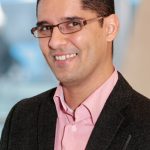 Chair: dr.ir. Luewton Agostinho, applied research professor Water Technology, NHL Stenden University
Chair: dr.ir. Luewton Agostinho, applied research professor Water Technology, NHL Stenden University
CV/BIO
Dr. ir. Luewton Lemos F. Agostinho is a Civil Engineer graduated by Federal University of Fortaleza with a master degree in Sanitation, in the same institution, and a PhD in Water Technology by TU Delft/Wetsus. Currently dr. Agostinho is researcher at Wetsus European Centre of Excellence for Water Technology and professor (Water Technology) for NHL Stenden University of Applied Sciences. His main research topics are thermal desalination, electrochemical systems applied to drinking water treatment and electrohydrodynamic atomization.
Program:
- dr. ir. Jan C. M. Marijnissen: The use of electrohydrodynamic atomization in the simple-jet mode in a single step thermal desalination system
- dr. ir. Mindert de Vries: Salinity and productivity in muddy landscapes; impacts of climate change
- dr. Eric van Sonsbeek: Total Water Recovery
- Farnoosh Fasaei, MSc: Water purification systems for industrial condensate streams
THE USE OF ELECTROHYDRODYNAMIC ATOMIZATION IN THE SIMPLE-JET MODE IN A SINGLE STEP THERMAL DESALINATION SYSTEM
dr. ir. Jan C. M. Marijnissen
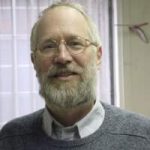 Thermal desalination systems are probably the first system ever used to convert salt water into drinking water. In the core of such systems, an atomization module is applied to increase the available interface and improve evaporation. Electrohydrodynamic atomization (EHDA) is known by its capability of manipulating droplets size and size dispersion and thus, creating better water sprays which could eventually improve the efficiency of thermal desalination. In this talk we will present different experiences acquired in a project which combines expertise from The Netherlands and Kenya to build up and operate an EHDA thermal desalination system designed for the production of fresh water from salt water in tropical (developing) countries.
Thermal desalination systems are probably the first system ever used to convert salt water into drinking water. In the core of such systems, an atomization module is applied to increase the available interface and improve evaporation. Electrohydrodynamic atomization (EHDA) is known by its capability of manipulating droplets size and size dispersion and thus, creating better water sprays which could eventually improve the efficiency of thermal desalination. In this talk we will present different experiences acquired in a project which combines expertise from The Netherlands and Kenya to build up and operate an EHDA thermal desalination system designed for the production of fresh water from salt water in tropical (developing) countries.
CV/BIO
Dr. ir. Jan C. M. Marijnissen is a former TU Delft professor and head of the Delft Aerosol Technology Laboratory. Currently he is visiting professor at Nairobi University and Florida State University working on combined projects specially for the application of electrohydrodynamic atomization in different processes. For the last years Jan Marijnissen has successfully worked on stablishing a synergetic cooperation between Kenia (Nairobi University) and The Netherlands (NHL Stenden University of Applied Sciences) to stimulate the development of EHDA based technologies which could be applied in tropical (developing) countries.
SALINITY AND PRODUCTIVITY IN MUDDY LANDSCAPES; IMPACTS OF CLIMATE CHANGE
Dr. ir. Mindert de Vries
Sea level rise is accelerating, weather is becoming more extreme. How are the low lying muddy landscape reacting and what are the consequences? In this talk I present the main trends and impacts and explore possible avenues to mitigate and to adapt to the new normal. In the north of the Netherlands there is wealth of research, field pilots and initiatives that will be instrumental to provide solutions that are of effective scale and that provide new business opportunities.
CV/BIO
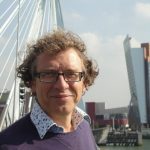 Mr. De Vries is an expert advisor specialized in environmental impact assessment and integrated coastal zone management. He has extensive knowledge of coastal ecosystems, nature restoration, eco-engineering of soft and hybrid flood defense measures. Mr. De Vries is a project leader of many studies within the Netherlands and abroad, particularly for the Horizon 2020, in the United States and Southeast Asia. He has held a professorship on eco-engineering on the University of Applied Sciences Hogeschool Zeeland and is now starting up a center of expertise on climate adaptation of muddy coastal landscapes SALT CAMPUS.
Mr. De Vries is an expert advisor specialized in environmental impact assessment and integrated coastal zone management. He has extensive knowledge of coastal ecosystems, nature restoration, eco-engineering of soft and hybrid flood defense measures. Mr. De Vries is a project leader of many studies within the Netherlands and abroad, particularly for the Horizon 2020, in the United States and Southeast Asia. He has held a professorship on eco-engineering on the University of Applied Sciences Hogeschool Zeeland and is now starting up a center of expertise on climate adaptation of muddy coastal landscapes SALT CAMPUS.
TOTAL WATER RECOVERY
Dr. Eric van Sonsbeek, Owner, Director Engineering & Projects EColoRO, The Netherlands
EColoRO is a young company that supplies total re-use waste water systems for the textile industry using the so called EColoRO concept. The final treatment step contains Reverses osmosis systems. The main problem of an RO is the high salt content of the brine. Sometimes it is allowed to discharge it, mostly not and the tendency is that salt has to be removed. This means that brine treatment using desalination technologies which are economical feasible has to be developed because at the moment they are not on the marked ore too expensive. Aquatration is a combination of existing and new membrane technologies which re-uses the heat internally to reduce the operational and investment costs to an economically acceptable level. In this presentation the Aquatration process will be explained combined with the next steps required to bring it to the marked.
CV/BIO
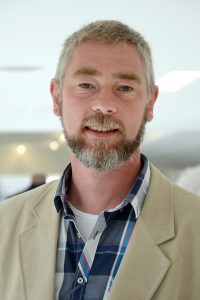 Eric is co-founder/owner and Technical director of EColoRO. He has built up a vast experience in the water technology business during the last 25 years at various engineering and water solution companies, he has as engineer and technologist been involved in various new water and waste water concept introductions and has started his own company in 2013 together with Marc Feyaerts to work out the EColorRO concept (Waste water -re-use) and bring this to the market. Brine treatment is the next item to be solved, so Eric is evaluating/designing new treatment steps for that. Eric holds a Mr. Science from Twente Technical University in Chemical Engineering and a BSc from Hogeschool Twente and is active involved in various water related technical networks in Europe.
Eric is co-founder/owner and Technical director of EColoRO. He has built up a vast experience in the water technology business during the last 25 years at various engineering and water solution companies, he has as engineer and technologist been involved in various new water and waste water concept introductions and has started his own company in 2013 together with Marc Feyaerts to work out the EColorRO concept (Waste water -re-use) and bring this to the market. Brine treatment is the next item to be solved, so Eric is evaluating/designing new treatment steps for that. Eric holds a Mr. Science from Twente Technical University in Chemical Engineering and a BSc from Hogeschool Twente and is active involved in various water related technical networks in Europe.
WATER PURIFICATION SYSTEMS FOR INDUSTRIAL CONDENSATE STREAMS
Farnoosh Fasaei, MSc, Lecturer & Researcher, HZ University of Applied sciences, Zeeland, The Netherlands
The Zeeland Delta is a region coping with intense industrial activity and a scarcity of fresh water supply. This forces companies within its borders to look for innovative solutions to optimise their water balance, like “reuse” of wastewater, short-circuiting the water cycle. [The Interreg IMPROVED project developed a diversity of technologies which are tested on site in various chemical plants] in a plug & play mode. The two containerized mobile units are equipped with different and interchangeable process units, depending on the needs. Tests and measurements comprise of both on- and off-line measurements to determine the effects of physico-chemical treatment technologies, distribution impact and process performance of typical chemical downstream equipment like boilers, cooling towers, cracking systems.
On-site testing is performed on 3 industrial chemical sites : Dow Benelux BV, Yara Sluiskil BV and BASF Antwerp NV, while HZ University of Applied Sciences and Ghent University contribute to the ongoing research, the technological innovations and the optimisation process.
CV/BIO
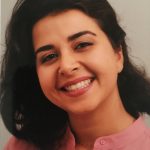 Farnoosh Fasaei, MSc, is Ph.D. candidate in Process technology: ‘System Analysis of Biorefinery’ at Wageningen University and Lecturer & Researcher at HZ University of Applied sciences in the province of Zeeland, The Netherlands. She strives to combine scientific founding with technical/practical knowledge in order to optimize techno-economic aspects of conventional process engineering approaches in industrial/scientific level.
Farnoosh Fasaei, MSc, is Ph.D. candidate in Process technology: ‘System Analysis of Biorefinery’ at Wageningen University and Lecturer & Researcher at HZ University of Applied sciences in the province of Zeeland, The Netherlands. She strives to combine scientific founding with technical/practical knowledge in order to optimize techno-economic aspects of conventional process engineering approaches in industrial/scientific level.